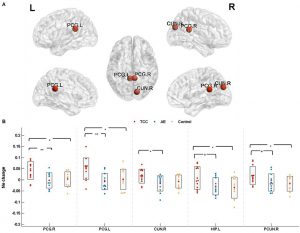Improve Nervous System and Cognitive Function with Tai Chi
By John M. de Castro, Ph.D.
“tai chi appears to improve executive function—the ability to multitask, manage time, and make decisions—in people without any cognitive decline. In those with mild cognitive impairment, tai chi slowed the progression to dementia.” – Harvard Health
Tai Chi is an ancient Chinese practice involving mindfulness and gentle movements. It is easy to learn, safe, and gentle. Tai Chi has been practiced for thousands of years with benefits for health and longevity. Tai Chi training is designed to enhance function and regulate the activities of the body through controlled breathing, mindful concentration, and gentle movements. Only recently though have the effects of this practice been scrutinized with empirical research. This research has found that it is effective for an array of physical and psychological issues. It appears to strengthen the immune system, reduce inflammation and increase the number of cancer killing cells in the bloodstream, improve cardiovascular health, reduce arthritis pain, improve balance and reduce falls. It also appears to improve attentional ability improve cognitive ability in the elderly, and relieve depression.
The nervous system is a dynamic entity, constantly changing and adapting to the environment. It will change size, activity, and connectivity in response to experience. These changes in the brain are called neuroplasticity. Over the last decade neuroscience has been studying the effects of contemplative practices on the brain and has identified neuroplastic changes in widespread areas. In other words, mindfulness practice appears to mold and change the brain, producing psychological, physical, and spiritual benefits. Hence, it would appear likely that Tai Chi practice may alter the brain networks underlying mindfulness.
In today’s Research News article “Tai Chi Chuan Alters Brain Functional Network Plasticity and Promotes Cognitive Flexibility.” (See summary below or view the full text of the study at: https://www.frontiersin.org/articles/10.3389/fpsyg.2021.665419/full?utm_source=F-AAE&utm_medium=EMLF&utm_campaign=MRK_1671974_a0P58000000G0YfEAK_Psycho_20210701_arts_A ) Cui and colleagues recruited healthy adults and randomly assigned them to either a control condition or to 3, 60 minute sessions per week for 8 weeks of aerobic exercise (Brisk walking) or Tai Chi practice. Before and after practice they were measured for cognitive flexibility and they also had their brains scanned with functional Magnetic Resonance Imaging (fMRI).
They found that only after Tai Chi practice there was a significant increase in cognitive flexibility. The fMRI revealed that Tai Chi practice increased brain local efficiency compared with general aerobic exercise. Local efficiency reflects brain information transmission and processing in local densely interconnected areas. Tai Chi practice also increased the clustering coefficient of brain activity which reflects how well brain areas connect with other areas. Tai Chi practice increased Nodal global efficiency which reflects the efficiency of information transmission within brain networks. Importantly, they found that the higher the Nodal global efficiency the greater the level of cognitive flexibility. These changes with Tai Chi practice suggest that it increases brain specialization and that this is related to better cognitive ability.
A strength of the present study was that Tai Chi practice was compared to another aerobic exercise, brisk walking. So, it can be concluded that the effects observed were due to Tai Chi practice per se and not to the exercise provided by Tai Chi. The findings suggest then that practicing Tai Chi changes the brain making it better interconnected with a greater ability to share information and these changes are associated with greater cognitive flexibility. This shows that Tai Chi practice changes the brain in beneficial ways. This may be responsible for the ability of Tai Chi practice to improve the physical and psychological processes especially in the elderly.
So, improve nervous system and cognitive function with Tai Chi.
“Tai Chi, a multicomponent mind-body exercise, combines slow physical activity with relaxation to serve as a movement meditation. Prior trials suggested that the beneficial effects of Tai Chi are created by a physical component which capitalizes on the benefits of physical exercise and a mind component which additionally promotes psychological well-being, life satisfaction, and improved perception of health.” – Chunlin Yue
CMCS – Center for Mindfulness and Contemplative Studies
This and other Contemplative Studies posts are also available on Google+ https://plus.google.com/106784388191201299496/posts and on Twitter @MindfulResearch
Study Summary
Cui L, Tao S, Yin H-c, Shen Q-q, Wang Y, Zhu L-n and Li X-j (2021) Tai Chi Chuan Alters Brain Functional Network Plasticity and Promotes Cognitive Flexibility. Front. Psychol. 12:665419. doi: 10.3389/fpsyg.2021.665419
Objective: This study used resting-state functional magnetic resonance imaging to investigate the effects of 8 weeks of Tai Chi Chuan and general aerobic exercise on the topological parameters of brain functional networks, explored the advantages of Tai Chi Chuan for improving functional network plasticity and cognitive flexibility, and examined how changes in topological attributes of brain functional networks relate to cognitive flexibility.
Methods: Thirty-six healthy adults were grouped into Tai Chi Chuan (Bafa Wubu of Tai Chi), general aerobic exercise (brisk walking), and control groups. All of the subjects underwent fMRI and behavioral assessment before and after the exercise intervention.
Results: Tai Chi Chuan exercise significantly enhanced the clustering coefficient and local efficiency compared with general aerobic exercise. Regarding the nodal properties, Tai Chi Chuan significantly enhanced the nodal clustering coefficient of the bilateral olfactory cortex and left thalamus, significantly reduced the nodal clustering coefficient of the left inferior temporal gyrus, significantly improved the nodal efficiency of the right precuneus and bilateral posterior cingulate gyrus, and significantly improved the nodal local efficiency of the left thalamus and right olfactory cortex. Furthermore, the behavioral performance results demonstrated that cognitive flexibility was enhanced by Tai Chi Chuan. The change in the nodal clustering coefficient in the left thalamus induced by Tai Chi Chuan was a significant predictor of cognitive flexibility.
Conclusion: These findings demonstrated that Tai Chi Chuan could promote brain functional specialization. Brain functional specialization enhanced by Tai Chi Chuan exercise was a predictor of greater cognitive flexibility.
